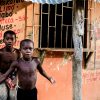Colombian children play in front of a grocery store advertising products in Palenquero
Palenquero is Latin America’s only surviving African-Spanish creole, that is spoken natively as a first language. Its speakers are based in the maroon town of San Basilio de Palenque on the Caribbean coast of Colombia. Palenque is considered to be the first self-liberated settlement of Afro-descendants in South America; founded in the 17th century by Africans seeking refuge from slavery. Although Palenquero employs the lexicon of various African languages, most of the Africans brought to the Caribbean coast of Colombia were from areas of modern-day Congo and Angola, and for this reason over 90% of the creole’s African-based lexicon has it’s origins in the Bantu linguistic family. The language is believed to be the most African-infused creole in the Americas, given it’s long history and isolation from European languages, and for this reason there’s little mutual intelligibility between Spanish and Palenquero speakers.
In the last few decades there has been a language shift from Palenquero to Spanish, and for this reason the number of native speakers has dropped significantly. It is estimated that only about half of the town speaks Palenquero fluently, that 88.7 percent of high school students use Spanish as their first language, and that only 15 percent of those students have frequent access to the Palenquero language outside school. One of the reasons for this shift, is that many Palenqueros traveled outside of their town to work in nearby banana plantations, where they were discriminated and ostracized for speaking their language by Spanish speakers; which until that time they had little to no interaction with. Another reason for the language shift, is due to accessibility with the rest of Colombia through the media.
However, with accessibility to the rest of Colombia via television and radio, also came accessibility to various cultures in Africa. Cultural interactions between Palenque and Africa have strengthened the black pride and consciousness of Palenqueros, which has also given the community an urgency to preserve the language. Many young musicians perform champeta songs in the Palenquero language; champeta is a popular genre of music which mixes Palenquero folklore and West/Central African genres such as soukous and highlife. Palenquero has also been made a mandatory language in schools, and linguists have also created the first dictionary of the language with the help of the towns elders. Recent studies have found a trend in younger generations, welcoming the concept of bilingualism.
